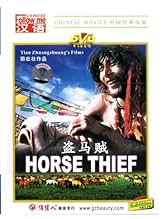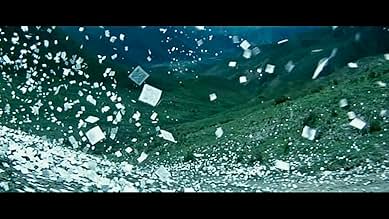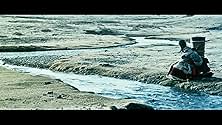CALIFICACIÓN DE IMDb
6.8/10
1.7 k
TU CALIFICACIÓN
Agrega una trama en tu idiomaA Tibetan man struggles to provide for his family.A Tibetan man struggles to provide for his family.A Tibetan man struggles to provide for his family.
- Dirección
- Guionista
- Elenco
- Premios
- 1 premio ganado en total
- Dirección
- Guionista
- Todo el elenco y el equipo
- Producción, taquilla y más en IMDbPro
Opiniones destacadas
Among Chinese "Fifth Generation" film directors, the name Tian Zhuangzhuang might not sound as resounding as his classmates Zhang Yimou or Chen Keige, both internationally and domestically, principally because his two most famous works THE HORSE THIEF (1986) and THE BLUE KITE (1993) are both under heavy censorship for pluckily tackling the hot buttons, the Tibetan ethnic minorities and the adverse affect of the Culture Revolution, respectively. Tian's directorial endeavor has reached a standstill since 2009, after the flop THE WARRIOR AND THE WOLF (2009). With 11 features and 1 documentary under his bet, he, has since reinvented himself as an actor, giving consecutive affecting performances in two films made by female directors, Sylvia Chang's LOVE EDUCATION (2017) and her protégée Rene Liu's directorial debut US AND THEM (2018), awarded with coveted GOLDEN HORSE Awards nominations.
Made between Chen's groundbreaking YELLOW EARTH (1984) and Zhang's spectacular RED SORGHUM (1988), THE HORSE THIEF, already Tian's third feature, reverently lifts the veil of the myth around Tibet and deploys a cinéma-vérité guideline in peering through the mores of its denizens - mostly through their religious rituals (profuse with prayer wheels, floating prayers, as well as clinquant temples) and quotidian activities (a haunting living sheep burying sequence and the displacement caused by a plague) - and relishes in the sublime, pristine natural and architectural landscape, the seasonal changes in the Qingzang Plateau, the Roof of the World, from verdant green to an overwhelming snow white.
Opening and closing with authentic scenes of celestial burials, which signifies an ouroboric Buddhist transcendence, the film's elliptical narrative loosely hinges on the titular thief Norbu (Tseshang), whose contravention takes its toll when he and his nuclear family is punished into exile in 1923, bereavement and poverty will assail him and wife Dolma (Dan), even the blessing of pregnancy doesn't augur well for a family at the end of their tether (underpinned by a chthonic, eery traditional performance of masked deities watched by the couple). Yet, through his minimalist plot, Tian astutely points up the perpetuating conflict in Norbu's illicit métier and his indefatigable piety, who habitually allots a tranche of his haul to the Almighty in order to alleviate his sins, especially when the seeming reckoning is subjected to his young son, Tian masterfully conjures up a series of blue-tinted superimposed sequences manifesting the kowtowing couple's repentance, foreseeing the guilty-driven Norbu's ultimate fate.
Besides Hou Yong and Zhao Fei's mind-blowing photography, Qu Xiaosong's cavernous, otherworldly score is equally substantive in honing up the film's superlative aura of exotica and mystique, only the dubbed Tibetan dialogue sounds a tad dissonant, loud and out of synchronicity, although it is a small triumph since the original mainland theatrical release is histrionically dubbed in Mandarin at the behest of the harsh censorship. More of an ethnic reportage than a compelling exposé, THE HORSE THIEF is the living proof of Tian's humanistic aptitude and profound veneration to the ethnic heritage, not to mention he is also bestowed with a keen eye and a competent hand in finding divine beauty, whose oeuvre is in much exigency of rediscovery.
Made between Chen's groundbreaking YELLOW EARTH (1984) and Zhang's spectacular RED SORGHUM (1988), THE HORSE THIEF, already Tian's third feature, reverently lifts the veil of the myth around Tibet and deploys a cinéma-vérité guideline in peering through the mores of its denizens - mostly through their religious rituals (profuse with prayer wheels, floating prayers, as well as clinquant temples) and quotidian activities (a haunting living sheep burying sequence and the displacement caused by a plague) - and relishes in the sublime, pristine natural and architectural landscape, the seasonal changes in the Qingzang Plateau, the Roof of the World, from verdant green to an overwhelming snow white.
Opening and closing with authentic scenes of celestial burials, which signifies an ouroboric Buddhist transcendence, the film's elliptical narrative loosely hinges on the titular thief Norbu (Tseshang), whose contravention takes its toll when he and his nuclear family is punished into exile in 1923, bereavement and poverty will assail him and wife Dolma (Dan), even the blessing of pregnancy doesn't augur well for a family at the end of their tether (underpinned by a chthonic, eery traditional performance of masked deities watched by the couple). Yet, through his minimalist plot, Tian astutely points up the perpetuating conflict in Norbu's illicit métier and his indefatigable piety, who habitually allots a tranche of his haul to the Almighty in order to alleviate his sins, especially when the seeming reckoning is subjected to his young son, Tian masterfully conjures up a series of blue-tinted superimposed sequences manifesting the kowtowing couple's repentance, foreseeing the guilty-driven Norbu's ultimate fate.
Besides Hou Yong and Zhao Fei's mind-blowing photography, Qu Xiaosong's cavernous, otherworldly score is equally substantive in honing up the film's superlative aura of exotica and mystique, only the dubbed Tibetan dialogue sounds a tad dissonant, loud and out of synchronicity, although it is a small triumph since the original mainland theatrical release is histrionically dubbed in Mandarin at the behest of the harsh censorship. More of an ethnic reportage than a compelling exposé, THE HORSE THIEF is the living proof of Tian's humanistic aptitude and profound veneration to the ethnic heritage, not to mention he is also bestowed with a keen eye and a competent hand in finding divine beauty, whose oeuvre is in much exigency of rediscovery.
This is a movie about human beings living in the stark and pitiless land of Tibet. Tibetans have a clear if not too numerous a presence in North India and I always felt deeply curious about these strangers from a land not too distant yet strange and mysterious. My first memories of these people are of tattered nomads moving in groups. Today they are educated, vocal and have prospered economically on Indian soil.The present film is like a response to an inborn craving to visit this land.
It is set in 1923, thus steering clear of political controversies in China, of which Tibet is now a part. Tibet is the highest plateau in the world, with an average altitude of 16,000 feet. Going by this film, it also seems the most wind blown place. The mists are always floating swiftly away and the pennants planted near temples fluttering noisily like an array of weathercocks. I cannot remember any movie with such splendor of cinematography, not even David Lean at his best. It is a world of transcendent beauty. There is nothing of the picture postcard tailor's dummy prettiness. The azure mountains, snow deserts and water bodies live and breathe as though with the presence of stern deities. The musical score , comprising natural sounds, muffled incantations and a continuous drone punctuated with funereal beats of percussion unspoken script or reverent commentary on this extra terrestrial world.
Norbu is a poor member of a nomadic tribe. He has a wife and small boy to support. Though devout he is forced into stealing horses for survival. He is expelled from his group under sentence of amputation if he should return. The film follows his journey through different regions in the course of which he loses his son to disease and sires another one. Religion and ceremonies dominate the life of these simple minded and plainspoken folk. Probably they need this belief as a necessity in their lives with death and starvation constantly dangling over them. Norbu is a god fearing person and it is only to save his offspring from the jaws of starvation that he is driven to stealing. He contributes a good part of his "earnings" to the temple.
Both the mood and the score is reminiscent of Tarkovsky's Stalker. These snow blown mountains and deserts are also inhabited by a mysterious presence hinting at realities other than the familiar. The word mesmeric applied to this film is not a cliché but an accurate description of it's power.
At the end of the day, people are the same--in Tibet, Calcutta or in the US.
It is set in 1923, thus steering clear of political controversies in China, of which Tibet is now a part. Tibet is the highest plateau in the world, with an average altitude of 16,000 feet. Going by this film, it also seems the most wind blown place. The mists are always floating swiftly away and the pennants planted near temples fluttering noisily like an array of weathercocks. I cannot remember any movie with such splendor of cinematography, not even David Lean at his best. It is a world of transcendent beauty. There is nothing of the picture postcard tailor's dummy prettiness. The azure mountains, snow deserts and water bodies live and breathe as though with the presence of stern deities. The musical score , comprising natural sounds, muffled incantations and a continuous drone punctuated with funereal beats of percussion unspoken script or reverent commentary on this extra terrestrial world.
Norbu is a poor member of a nomadic tribe. He has a wife and small boy to support. Though devout he is forced into stealing horses for survival. He is expelled from his group under sentence of amputation if he should return. The film follows his journey through different regions in the course of which he loses his son to disease and sires another one. Religion and ceremonies dominate the life of these simple minded and plainspoken folk. Probably they need this belief as a necessity in their lives with death and starvation constantly dangling over them. Norbu is a god fearing person and it is only to save his offspring from the jaws of starvation that he is driven to stealing. He contributes a good part of his "earnings" to the temple.
Both the mood and the score is reminiscent of Tarkovsky's Stalker. These snow blown mountains and deserts are also inhabited by a mysterious presence hinting at realities other than the familiar. The word mesmeric applied to this film is not a cliché but an accurate description of it's power.
At the end of the day, people are the same--in Tibet, Calcutta or in the US.
10zzmale
The theme behind this movie is the same as that of Ben Ming Nian (1990) directed by Mr. Fei Xie: criminals trying to go straight but are forced to go back to the old ways for survival due to lack of opportunities.
The theme reflected the problem of current society, and the problem started in the 1980's. As one of his early works and the political climates of China back then, it is understandable that the director adopted the cautious approach by using remote region such as Tibet and time setting that is more than half a century ago. One really needs to acknowledge the problem of current China (and in fact, the problem of many countries), in order to discover the link between the movie and its subtle attempt to criticize the contemporary society.
The theme reflected the problem of current society, and the problem started in the 1980's. As one of his early works and the political climates of China back then, it is understandable that the director adopted the cautious approach by using remote region such as Tibet and time setting that is more than half a century ago. One really needs to acknowledge the problem of current China (and in fact, the problem of many countries), in order to discover the link between the movie and its subtle attempt to criticize the contemporary society.
After hearing Martin Scorsese declare Horse Thief as the #1 film of the 90s (actually released in 1987) when co-hosting the annual "Best of" show with Roger Ebert, I set out to see this film. Luckily, there was a copy available in the library. Unfortunately, the library would not allow me to take it home. So, I was stuck watching this film on a 10 inch screen television in a cramped cubicle with uncomfortable headphones crushing my ears. Obviously, this was not the way that Tian intended his film to be viewed.
Tian Zhuangzhuang's third feature, Horse Thief, is essentially dialogue-free and is rather slim on plot. The film is reminiscent of the silent-era when directors were capable of manipulating the camera to communicate their desired idea. Basically, the film centers on the banishment of Norbu (forcefully personified by Rigzin Tseshang in an astonishing debut), a local horse thief, and his wife and son. Norbu gives up stealing horses for his wife and sets out to find a more respectable profession. When times get rough, Norbu is confronted with the reality that he must steal again to save his family from the harsh, unforgiving winter.
Tian's film has a striking realistic quality to it that plays like a documentary. In one scene, we are given the chance to watch a ritualistic ceremony designed to please the mountain god. While this scene evokes awe, some scenes may be seen as quite offensive. For example, Norbu comes up behind an unsuspecting lamb and slits its throat. The viewer is forced to watch the animal writhe and thrash agonizingly struggling for its last breaths. This scene, although I cannot deny its accuracy and technical beauty, is distressing to watch. The reality of this scene is not achieved through use of mechanical animals and fake blood; it is achieved by the actual killing of a lamb for the production of this film. Aside from this painfully unpleasant section, Tian's cinematic mastery is thoroughly evident.
Because of the deficient viewing conditions, I was only able to catch a glimpse of Tian's overwhelmingly glorious cinematography: Norbu dolefully places his son's dead body in the middle of a snow-covered meadow for the gods to take. In deep focus, the camera slowly reveals Norbu's utter aloneness and emptiness. In this one shot, Tian has created cinematic perfection.
Tian Zhuangzhuang's third feature, Horse Thief, is essentially dialogue-free and is rather slim on plot. The film is reminiscent of the silent-era when directors were capable of manipulating the camera to communicate their desired idea. Basically, the film centers on the banishment of Norbu (forcefully personified by Rigzin Tseshang in an astonishing debut), a local horse thief, and his wife and son. Norbu gives up stealing horses for his wife and sets out to find a more respectable profession. When times get rough, Norbu is confronted with the reality that he must steal again to save his family from the harsh, unforgiving winter.
Tian's film has a striking realistic quality to it that plays like a documentary. In one scene, we are given the chance to watch a ritualistic ceremony designed to please the mountain god. While this scene evokes awe, some scenes may be seen as quite offensive. For example, Norbu comes up behind an unsuspecting lamb and slits its throat. The viewer is forced to watch the animal writhe and thrash agonizingly struggling for its last breaths. This scene, although I cannot deny its accuracy and technical beauty, is distressing to watch. The reality of this scene is not achieved through use of mechanical animals and fake blood; it is achieved by the actual killing of a lamb for the production of this film. Aside from this painfully unpleasant section, Tian's cinematic mastery is thoroughly evident.
Because of the deficient viewing conditions, I was only able to catch a glimpse of Tian's overwhelmingly glorious cinematography: Norbu dolefully places his son's dead body in the middle of a snow-covered meadow for the gods to take. In deep focus, the camera slowly reveals Norbu's utter aloneness and emptiness. In this one shot, Tian has created cinematic perfection.
A fascinating window into the world of Tibetan tribal life. Beautifully shot with stunning locations. The narrative is a little weak, but makes up for it visually.
One draw back is a few scenes of animal cruelty. These images are what stayed with me most and unfortunately let down the movie.
¿Sabías que…?
- TriviaNumber 1 on Martin Scorsese's top 10 movies of the 90s list, which he presented on a special episode of At the Movies with Roger Ebert. Even though the movie was made and released in the 80s, it gain traction in the US during the 90s.
- ConexionesFeatured in Siskel & Ebert & the Movies: Best of the '90s (2000)
Selecciones populares
Inicia sesión para calificar y agrega a la lista de videos para obtener recomendaciones personalizadas
- How long is The Horse Thief?Con tecnología de Alexa
Detalles
Contribuir a esta página
Sugiere una edición o agrega el contenido que falta



















